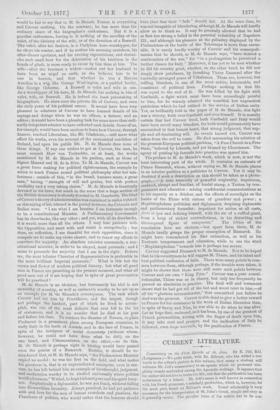CURRENT LITERATURE.
Commentary on the First Epistle of St. John. By E. Jelf, MD. (Longmans.)—We quito think, with Dr. Ellicott, who has added a few words to the editor's preface to this volume, that many a student will welcome Mr. Jail's commentary to an epistle which for profound sim- plicity stands unrivalled among the Apostolic writings. It appears that the author did not live to revise his MS., and that the publication has been undertaken by a friend. Mr. Jelf'a name is well known in connection with his Greek grammar, a scholarly production, which is, however, for the most part, based on Ktilmer's work. Sound scholarship is very necessary for the interpretation of St. John's Greek, simple and easy as it generally seems. The peculiar force of the article has to be con- tinually noted. For example, in ob. i. 5 ( sonic Os Ives) by 1. Oas. we are to understand the God of the Gospel ; and OF without the article denotes net merely a light, but light itself in its abstract perfection. Mr. Jeif is always particularly careful to noto all such distinctions, and In a writer like St. John this is specially important. By the expression '5 leseisaia FrafintoF (in ch. H. 16), Mr. Jell would understand jealousy and revenge, as well as sensual impulses ; and by 4tsaZa4s ee5 Aievis the same passage which appears in our version as "the pride of life," that temper of mind which is unduly self-reliant, and with which a self-complacent satisfaction in science, philosophy, or fame, or power is closely allied. No doubt he would have seen manifestations of this temper, such as St. John 'would have regarded as anti-Christian, in certain modern attitudes of physical science. Ho observes that the groat heresy of St. John's time, the "Antichrist," as the apostle calls it, was not a disbelief in the Gospel as the scheme of religion, but a 'disbolief in the divine nature of Jesus,—and this, he adds, is the heresy of our times. By the xpietsa or unction, by means of which Christians, according to St. John, can dia- tinguish truth from error, our author says is signified "the gift of spiritual discernment." The difficult passage in ch. v. 6 (" This is he that came V xcce talcom4E"), is interpreted to mean that the Messianic mission of Jesus was characterised by the baptism of water and the blood of the cross. Mr. Jelf admits that the words are obscure, and are susceptible of a groat variety of explanations. His own views strike us as, for the most part, reasonable, and his commentary may be profitably studied by all who wish to have a further insight into one of the most remarkable portions of the Now Testament.



































 Previous page
Previous page